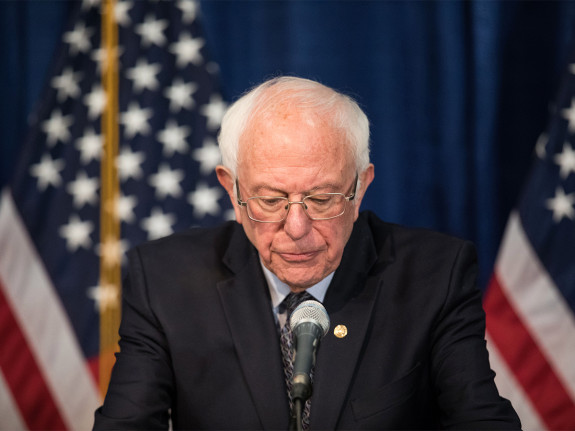
By Ellyn Fritz || Staff Writer
In the midst of the coronavirus pandemic, Bernie Sanders dropped out of his second run for President last week. After a series of losses to Joe Biden in key states, it became evident to Sanders that it was time to end his presidential candidacy. This marked the end of a quest that characterized the Vermont senator as the promoter of progressivism and cleared the path for a general election between Democratic nominee Joe Biden and President Trump, amidst a national crisis.
Mr. Sanders live-streamed his decision and put it in context with the current coronavirus situation, saying “I cannot in good conscience continue to mount a campaign that cannot win and which would interfere with the important work required of all of us in this difficult hour. Sanders added that “while this campaign is coming to an end, our movement is not.”
Following his departure from the race, Bernie Sanders joined Joe Biden on a livestream to announce his endorsement, putting the weight of his left-wing support to Biden’s candidacy in an attempt to unify the Democratic party to unseat President Trump come fall. Sanders and Biden discussed the nation’s policy response to the coronavirus and the formation of several task forces on shared policy concerns, including the economy, education, and criminal justice.
Sanders’ departure comes as a blow for progressives, who demanded a voice from the Democratic Party on issues like universal health care, climate change, and the effects of growing economic inequality. Despite Sanders’ call for his loyal following to back Mr. Biden, young and passionate Sanders’ supporters are hesitant to embrace a moderate nominee after pinning their hopes on the progressive Sanders. In the coming months for Joe Biden, it is important for him to win over Sanders’ primary voters to prevent third party voting or even not voting at all.
In his endorsement speech for Joe Biden, former President Barack Obama called for the unification of democratic voters behind presidential candidate Biden, explicitly the supporters of Bernie Sanders. As the New York Times put it, Obama emerged from political hibernation to endorse his previous vice-president and speak to how Mr. Sanders’ progressive ideas would be reflected in Mr. Biden’s campaign moving forward. Mr. Obama went on to emphasize the pivot Biden has made to his argument since receiving the nomination: from returning to the pre-Trump status quo to an argument that current action and policy is not enough. Mr. Obama echoed progressive candidates that there is a need for “big structural change” and that “the Democratic Party will have to be bold.”
As the general election shapes up to be a referendum on President Trump’s handling of the coronavirus, Mr. Obama made the argument explicit, saying that “moments of great crisis” revealed the need for strong leadership. To Mr. Obama, he spoke how this type of leadership is based on humility, honesty, and grace, and guided by experience and knowledge. In combination with Biden’s qualifications and the type of leadership the nation needs amid a crisis, Mr. Obama said he was proud to endorse Mr. Biden for president.
On April 15th, Elizabeth Warren was the final of Biden’s former top competitors to nominate the Presidential Candidate. The former 2020 Democratic presidential candidate tweeted out her endorsement, “In this moment of crisis, it’s more important than ever that the next president restores Americans’ faith in good, effective government—and I’ve seen Joe Biden help our nation rebuild. Today, I’m proud to endorse @JoeBiden as President of the United States.” The party has officially coalesced around Biden, but his victory will remain uncertain until November.
Sophomore Ellyn Fritz is a staff writer. Her email is efritz@fandm.edu.